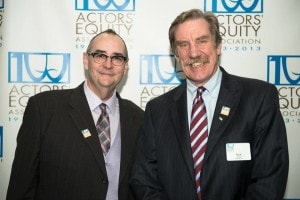OKLAHOMA CITY, OKLA.: No matter how close-knit a theatre community prides itself in being, most theatre artists and organizations tend to function as solitary entities. Many nonprofit organizations that blossomed in the 1970s and ’80s took pride in becoming fully independent, and that model lives on. The artists that managed them then, and many now, learned early to fly solo. They flourished in a creative arts paradigm that rewarded individual expression. Consequently any consideration of open collaboration between peers can elicit a wariness and reluctance from established arts organization managers.
Is there an alternative, cooperative approach that can foster growth and expanded community engagement in the 21st century, without sacrificing organizational integrity or independence? Donald Jordan, longtime Equity actor and founding artistic director of Oklahoma City Repertory Theatre (a.k.a. CityRep), has embraced collaboration since his company’s inception, and employs it routinely. The latest example of is CityRep’s current production of Katori Hall’s The Mountaintop, performed in conjunction with the Pollard Theatre in Guthrie and Oklahoma City’s Poteet Theatre.

In person, Jordan exudes warmth, enthusiasm and unshakeable devotion to theatre. Something of an Energizer Bunny of creativity in Oklahoma City and throughout the region, when Jordan is not working on a production of his own, he regularly attends other shows around Oklahoma and Texas, attired in his trademark denim overalls. In his college days at Oklahoma City University (OCU), Jordan dreamed of founding a regional professional theatre company, along with close friend and frequent college stage partner Jonathan Beck Reed. Both went on to careers as professional Equity actors, working at well-established companies and touring in major shows across the U.S., Canada and the Middle East before returning to Oklahoma City to make it home.
“Collaboration was a concept Jonathan and I brought to the start-up company from the very first, along with our other founding partners,” Jordan recalls. “As we left Oklahoma after college to work at a wide array of professional theatres, we experienced the benefits of collaboration and wanted to incorporate them into our fledgling dream enterprise. That dream was to have a year-round professional company based in central Oklahoma—a challenge to support at the level we envisioned.”
The duo’s goals were indeed lofty: They wanted to give back Oklahoma City University, the college that had given us their foundation, and they wanted to open their doors as an Actors’ Equity Association (AEA) affiliate. The actors’ union “took a chance on us as a start-up, trusting our aspirations to produce national-caliber work throughout the region. We now have a diverse, growing Equity community, and CityRep thrives.”
Apart from summer stock with Lyric Theatre, there were no full-time opportunities for Equity artists in Oklahoma until CityRep emerged. And those benefits have ripple effect, as collaborating companies have begun using guest artist contracts and some have affiliated with AEA. While native Oklahomans who have made national careers for themselves—Kristen Chenoweth, Kelli O’Hara and CityRep company member Stacey Logan—can come home to perform occasionally, increasingly, professional theatre artists who choose to live year-round in Oklahoma find they can maintain a sustainable income.
Coproducing high-caliber theatre can help expand the bottom line and upgrade resources like sets and costumes and promotion. Jordan explains with a theoretical example: “If Company A has a total production budget of $50,000, that limits their resources in producing a top-level show. If they collaborate with Company B, the budget may become $80,000. Both companies invest a smaller amount but have a bigger budget to enhance and promote their coproduction and can afford to run the production longer. Add a third partner, Company C, and the potential grows exponentially. Overall attendance may triple, depending on each company’s audience base. It’s not about competition; it’s about mutual support. With this model, everybody wins.”

In addition to its yearly coproductions with OCU, CityRep began to expand its collaborations in 2008. That’s when the company joined forces with the Pollard Theatre, in nearby Guthrie, Okla., to coproduce The Laramie Project. Jordan had proposed producing the work to his board, as had Pollard’s artistic director, W. Jerome Stevenson. Given the work’s controversial subject matter, many board members worried it would be risky to produce it in conservative Oklahoma. That’s precisely why it was important to produce there, says Stevenson.
“I had talked about producing it for years in Guthrie, a small country town similar to Laramie, Wyo.,” says Stevenson. “Don and I began discussing our belief that the play is about the destructive nature of hate and the need to foster tolerance in communities to counter it.” There was power in numbers, it turned out: Thought CityRep’s board hesitated, Stevenson says, he and Jordan “resolved that if we joined forces and coproduced in both towns, we would validate each other and reinforce the play’s message of tolerance.” He says that CityRep’s “national standing” lent “gravitas to our mutual enterprise. The solo production risk diminished as we moved forward.”
Four performances each in Oklahoma City and Guthrie played to positive audience response, and both companies ended up with twice the usual attendance for a non-musical production. The Oklahoma Gazette said the collaboration “might be the theatrical event of the year.” Board members who originally voiced misgivings recognized the work’s transformative power and learned to trust their artistic directors’ instincts.


